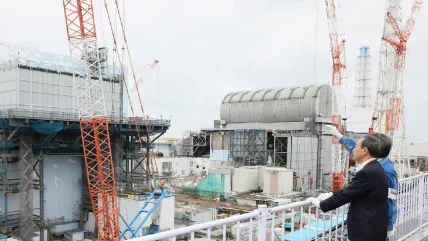
Japan’s government has requested Tokyo Electric Power Company Holdings (Tepco) to promptly proceed with its preparations for the discharge into the sea of ALPS treated water stored at the Fukushima Daiichi NPP, according to a statement by International Atomic Energy Agency (IAEA) Director General Rafael Mariano Grossi. This is in accordance with the implementation plan approved by Japan’s Nuclear Regulation Authority. “If there is no interference due to weather or sea conditions, the discharge into the sea is expected to start on 24 August,” IAEA noted.
The water, used to cool the melted reactor cores in the aftermath of the 2011 nuclear disaster at Fukushima, is stored in around 1,000 huge tanks at the plant containing more than 1.3m tonnes and total storage capacity has been reached. The contaminated cooling water and groundwater is treated by the Advanced Liquid Processing System (ALPS), which removes most of the radioactive contamination, with the exception of tritium. The water will be diluted so that tritium levels fall below national regulations before it is released, following multiple checks, through an undersea tunnel one kilometre offshore. The release will take place over several decades.
Over the past two years the IAEA has conducted a detailed review of the safety related aspects of handling and discharge of ALPS treated water and issued a comprehensive in July. The report concluded that the approach and activities for this discharge are consistent with relevant international safety standards and would have a negligible radiological impact on people and the environment. IAEA has opened an office at the site and will continue to monitor the situation during the discharge phase.
“IAEA staff are working there so that they can continue to monitor and assess these activities on site to ensure that they continue to be consistent with the safety standards, including on the day of the start of the discharge and after,” Grossi said. “The IAEA will also publish available data for use by the global community, including the provision of real-time and near real-time monitoring data.”
The discharge, however, continues to meet opposition from Japanese fishing communities as well as from South Korea and China.
Japanese Prime Minister Fumio Kishida said, “We confirmed that we will put in place all measures available at the current time to ensure safety, counter false rumours and help locals keep their jobs.” He added: “The government will take responsibility for necessary measures until the release of the treated water ends, even if it takes many decades, so as to counter false rumours and ease locals’ anxieties.” The government has set aside a JPY80bn ($553m) fund to deal with any damage from misinformation. According to Yomiuri Shimbun, this will be used to purchase fish if sales decline, to develop online sales channels, and to support energy conservation on fishing vessels.
Since July, China has inspected Japanese marine products for radiation describing this as a countermeasure for the planned release. “Once the release begins, China may further tighten import restrictions. Tokyo intends to continue to demand that Beijing respond based on scientific evidence,” Yomiuri Shimbun reported.
As to South Korea, IAEA’s Grossi says the agency will regularly provide information about the discharge of the treated water under an agreement “which stresses the importance of transparency to address public concern in the country”. With this aim, the two sides have agreed to establish the IAEA-ROK Fukushima Information Mechanism (IKFIM) to provide a framework for the flow of information.
Under IKFIM, the IAEA will provide up-to-date information to Korea and facilitate visits by Korean experts to the IAEA office at the Fukushima site. IKFIM also includes an arrangement for notifications in case of abnormal events. The agreement is a follow-up to the Grossi’s visit to Korea in July to present the IAEA’s comprehensive report on its independent safety review of Japan’s release plan. “From the start of the IAEA’s work in assessing the safety of the water discharge, I have pro-actively engaged with the Republic of Korea and other countries to keep them informed about our important activities in this regard,” said Grossi. “The only way to address legitimate concerns of the public is to keep them informed.”






